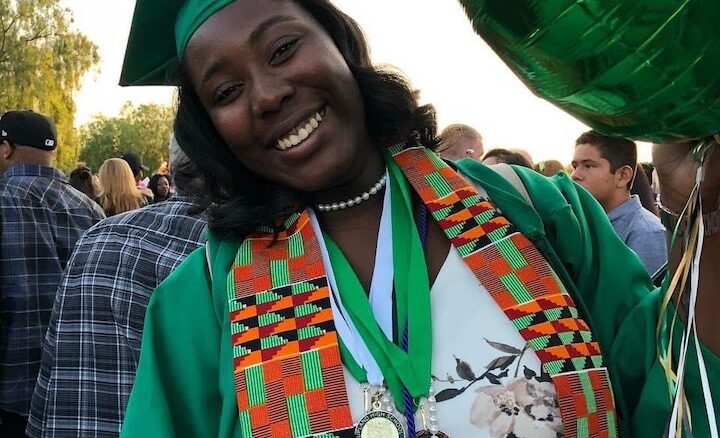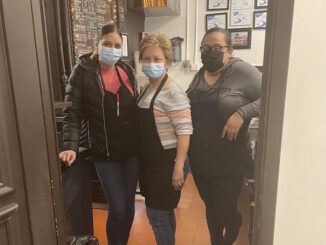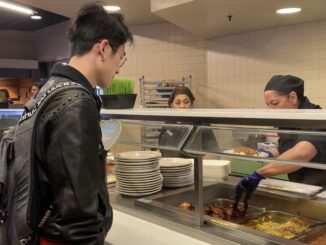
Pepperdine junior Launnie Phillips experiences waves of fear daily.
She fears for Black family members and friends amid police shootings and protests. She worries about the impact of COVID-19 on family income. And she wonders where the support is from the university she calls home.
“Our institution loves to go straight to the Bible for anything,” said Phillips, a junior psychology and Hispanic studies major. “Sometimes we just need to hear: ‘We see you, we hear you, and we’re going to work to make your voices heard and known.’”
Phillips said she is staying afloat despite the chaos around her. But her fellow Black peers at Pepperdine are also combating these rough emotional waters.
Amid numerous police shootings, protests and a deadly pandemic, Black students at Pepperdine said they feel unseen, unheard and unsupported by faculty and staff. Black students at Pepperdine are facing racial trauma while simultaneously dealing with the coronavirus pandemic, which has statistically hit Black families harder. Students would like to see more support from professors and administration amid the chaos.
Decades of trauma
Trauma lies deep within the Black community from decades of racism, police brutality and discrimination. The recent killings of George Floyd, Ahmaud Arbery and Breonna Taylor are just a few of the traumatic deaths the Black community has endured.
Phillips said she fears the death of yet another Black person in America.
“I’m always looking around to see if there’s a police officer around or behind me,” Phillips said. “It’s really sad because I don’t do anything wrong, I’ve never been in any type of legal trouble. I don’t want anybody to end up being another headline.”
While Phillips faces these fears, Naya Edwards, a sophomore sports medicine major, said she is trying her best to refrain from feeling numb.
“For me personally it’s kind of something that’s not really surprising,” Edwards said. “It doesn’t hurt as bad the more you see it.”
Olivia Robinson, a recent 2020 graduate, has had to find ways to keep her peace.
“I think I’ve found myself trying to distance from social media,” Robinson said. “Especially when I see a headline. It’s kind of like you already know what to expect.”
Peace Ikediuba, another Pepperdine 2020 graduate, said her feelings toward the chaos fluctuate.
“I think sometimes I have to force myself to choose to be joyful,” Ikediuba said. “And at other times I’m overwhelmed with everything that is going on with COVID and police brutality and just Black death and how common it’s been.”
Jeffery Williams, a counselor at the university, said he understands and shared his own range of emotions.
“I go from anger to frustration to sad to motivated to make a change,” Williams said. “I am not angry with police anymore, I used to be really angry with police. Now I’m angry with citizens.”
Williams said he believes citizens have to demand the change they want to see. He’d like to see changes to the justice system, which he sees as most valuing and protecting whiteness.
The Black Lives Matter movement
The killing of George Floyd rocked the nation and sparked numerous protests around the world demanding change. The Black Lives Matter movement, founded in 2013, gained massive attention as people joined the fight for Black lives and against systemic racism.
Williams and Pepperdine’s Black students found both solace and hope in the protests. Williams is excited. He said he believes that the young adults asserting pressure on officials is needed and that healthy disruption is important.
Ikediuba found herself emotional over the coalition.
“I think it’s heartbreaking, but it’s been a beautiful thing to see,” Ikediuba said. “That kind of unity is enough to make me cry.”
Robinson said the rise to action has been very powerful and inspiring and has made the situation feel less hopeless. She also expressed deep sorrow for the individuals who didn’t make headlines.
“I don’t really think there’s a die down of asking for basic human rights,” Robinson said. “With the quantity of how many shootings and atrocities there have been you do see some get skipped over. You do see some that don’t make the national news, you don’t hear their name in the chants. It’s really sad that any of them would miss their moment for reverence.”
Robinson found herself grateful for all the people who have joined the movement.She said that it’s important to value the lives of individuals before they’re at the point of being taken.
“I’m definitely very appreciative that people have joined the movement,” Robison said. “… to actually see people participating in the movement with their bodies, with their money with their time.”
Phillips said she believes the movement is just the beginning of something much bigger.
“I do think the BLM movement is a most definitely necessary movement,” Phillips said.
“It shouldn’t be but it is. We are the generation that is going to stand up for our rights that we already have but people don’t want to acknowledge.”
Edwards supports the movement, but questioned the rioting.
“I don’t necessarily agree with rioting,” Edwards said. “I understand why … It’s hard to listen to someone tell you not to be angry especially when they’re the source of your problem.”
Along with the racial issues from the outside world, students face a different kind of trauma at the university. On Instagram the @BlackatPepperdine page amplifies the voice of the Black students and alumni who have endured racial traumas at Pepperdine. The posts entail racial incidents with other students, faculty and staff.
COVID’s disproportionate effect on Blacks
In addition to systemic racism, researchers have found that COVID-19 is disproportionately affecting the Black community at an alarming rate, according to the Center for Disease Control and Prevention. The pandemic is directly affecting Edwards’ family and their ability to work.
“Money is a little tight and we’re all trying to step up,” Edwards said. “My mom is in the education department so she hasn’t had a job for a while. My mom really wants to go back to work, but given the circumstances … it’s kind of sketchy because she has some health conditions where if she gets sick that would be like a big threat to her life.”
COVID is also affecting Phillips’ family’s funds and household norms.
“My dad is self-employed, he does hair,” Phillips said.“They had to close the shop, so that impacted income. My mom is working from home and my stepmom is a teacher working from her classroom with no kids. It’s been an adjustment.”
Although Robinson’s family have not contracted the coronavirus, the weight of COVID and police violence sometimes stops her day.
“When I’m really feeling the loss of lives, I get to a stopping point in my day,” Robinson said. “And pretty much cancel the rest of the day. It’s really hard to focus on other things sometimes.”
Robinson described the process of responding to police brutality with trying to get over being sick. Despite this heartbreaking process, Robinson continues to fight for change.
“It’s aftermath is like being sick and going through a recovery period, but you never recover,” Robinson said. “I feel the strength needed to keep participating in making changes happen.”
The silence of professors
A handful of students expressed their concerns about the absence of these important conversations about racism, the Black Lives Matter movement and the impact of COVID-19 in classrooms. The students believe that their professors are overlooking these issues. For most students, their professors’ silence has caused a disconnect.
“There’s a lot of crazy things happening right now,” Edwards said. “It just feels like an elephant in the room every time we go and have class and disregard everything that’s going on in the world. None of them have asked or said anything about Black Lives Matter.”
Phillips said she has had possibly one professor who has mentioned the unfortunate events. She believes it’s because a lot of the professors are not equipped to facilitate such conversations, which leads to silent sorrows in the classroom.
“A lot of my professors just haven’t said anything about it and it hurts me,” Phillips said. “… it makes me feel unsupported and not seen. There are Black students that are sitting in your classroom that don’t feel supported and it’s your job to create a safe learning environment for students in general and a lot of us aren’t getting that.”
Edwards said she sometimes feels hopeless due to the very little progress Pepperdine has made despite having multiple conversations about race. The ongoing police violence makes her angry and scared because she has to worry about constantly getting stopped in predominantly white areas.
She also adds that she is not allowed to see her friends due to COVID-19. She emphasized the heavy workloads from classes that she deals with on top of these issues. All of these issues diminished her ability to be as productive as she normally would.
“Not sure I’m depressed, but I feel anxious, stressed, unmotivated, and often sleep deprived due to the current social climate,” Edwards said.
In terms of COVID-19, Ikediuba emphasized the importance for professors to realize that not all students have the luxury to focus on engaging solely in academics while being at home.
“Extending the utmost grace that you can,” Ikediuba said. “And I don’t think students should have to ask for that.”
Staff and faculty respond
Williams sympathizes with the Black students and acknowledges the effect that being at a predominantly white university has on them.
“ I know that they are affected by racism for the Black students that I do see,” Williams said. “It’s something that is pervasive, they feel uncomfortable largely.”
Williams took an emotional pause before he continued.
“…and that saddens me,” Williams said. “You come to this beautiful university, you come to this beautiful place, then they get there and they just continue to experience microaggressions at every turn. If people don’t feel welcomed, if people don’t feel supported, if people don’t feel seen, I think it’s important to do the work to make sure they do.”
Williams said he believes some professors have chosen to be silent on these issues rather than speak up due to fear. He believes being afraid is preventing the university from dismantling the problems.
“I believe many are just scared of messing up,” Williams said. “We should be leading these conversations not running away from them.”
Chris Doran, professor of religion and Seaver Faculty Senate president, also believed that the silence from faculty and staff derives from fear. Doran said a lot of faculty and staff have the white fragility complex, which he believes breaks the trust between students and faculty, making it difficult to discuss hard topics.
“To faculty members in particular, if someone says something that is supporting a form of white supremacy or white privilege in a way that is harmful to other people in the room or other people not in the room and a professor doesn’t at least say ‘What did you mean by that or are you sure you meant that?’” Doran said. “Then you’re condoning that and our students of color pick up on that very quickly. That breaks down trust.”
Similarly, not addressing police violence in the classroom as soon as it happens can also break trust.
“If you’re not going to discuss something like police brutality when it is going on, like in real time you know like the day after or two days after whenever your class meets, then does it say to a student of color in your classroom that doesn’t matter?” Doran said.
Students wished professors had more cultural competency training. Although Doran does think that mandatory training would be very helpful, he also believes that loving your neighbor shouldn’t be that complex.
“I’m not convinced at this point that all of those trainings that one could go through would make you a more empathetic person unless you look inside your heart and say I want to be a better human being,” Doran said.
He weighed in on the @BlackatPepperdine page, noting that he’s been hearing of racial incidents on campus from Black students and other students of color for 13 years.
“The sad part is it didn’t surprise me at all because I’ve been hearing these stories behind the scenes,” Doran said. “I’ve been trying to work with students behind the scenes to help make this a better place. Seaver College is my alma mater. I want this place to be better.”
Seeking support
Although students are struggling with the stresses of the world, they still find unique ways to maintain community and positivity. Pepperdine offers a few options for support, such as the Student Care Team and the Counseling Center. Some students have utilized these while others have taken different routes.
Edwards leans on her community and self-care days to get her through these unprecedented times. Her self care days, which are usually on Wednesdays and Saturdays, entail a range of activities including exercising, watching movies, doing her nails or having a karaoke night.
“I personally haven’t gone to the Counseling Center,” Edwards said. “There has been someone who’s reached out to us to share a space. It helps having BSA events and self-care days.”
Robinson finds comfort in relationships with her friends and family.
“I’ve made a new goal for myself to hit up three different people each week,” Robinson said. “So that way the connections that I have aren’t left by the wayside.”
Ikediuba has followed a more spiritual approach to healing.
“I’ve been praying,” Ikediuba said. “I should be going to therapy, but it’s on the back burner. Once I get the money I’ll go.”
Phillips has started her journey to healing with a personal therapist.
“I am doing OK,” Phillips said. “I’m hanging in there. I see a therapist regularly so we’re getting there.”
Williams suggested students utilize the Counseling Center and provided other creative ways to cope, including exercising, communicating and surrounding themselves with love.
“Staying connected with people that really know them and really care for them and really love them unconditionally,” Williams said. “Scanning the world every day for at least three or four things they’re grateful for to kind of help them stay in that mindset. In this day in time a meditative practice.”
The Counseling Center offers Sanvello, a mindfulness app that is free to all Pepperdine students.
The Counseling Center has a page specifically for Black mental health and a support group for Black students.
Making progress
The students believe that the university can improve the experience of their Black students and the majority believe acknowledging the university’s failure at inclusiveness is the first step.
“Our community needs to be challenged to be intentional about our allyship, questions and discussions,” Phillips said. “The first step is to acknowledge that there is a problem.”
Ikediuba doesn’t think that the university has offered the resources to assist Black students with racial trauma experienced within and outside of Pepperdine.
“I think that if they really addressed it I wouldn’t have the same experience as someone years ago,” Ikediuba said.
Robinson said Pepperdine’s public apologies are insufficient noting their lack of attention to detail.
“I think having an editor for these apologies or notices would be essential,” Robinson said. “Even if they get it right the fifth time, the first four times definitely discredit them. They lower the veracity of their statements.”
Edwards expressed her frustration with how rarely the university has addressed police violence and the Black Lives Matter movement through email.
“It’s the fact that we had to apply so much pressure for you to say something and I haven’t heard anything since,” Edwards said.
Robinson said it is exhausting to have to educate teachers on the experiences of Black students.
“I think at times the university has asked for help and has asked for guidance,” Robinson said.
“But they’re asking students. Allow us to have a college experience in which we aren’t responsible for being the teacher’s teacher.”
Keliya Perry completed the reporting for this story in Jour 241 in Fall 2021 under the supervision of Dr. Christina Littlefield and Dr. Theresa de los Santos. Dr. Littlefield supervised the web version of the story.




